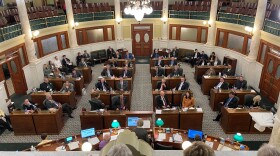State Sen. Lee Schoenbeck, R-Watertown, will not return to the state Capitol next year.
Schoenbeck was first elected to the legislature in 1995 and he’s served four different terms since then. Over the years, Schoenbeck has helped reshape how the Senate is run.
As Senate President Pro Tempore, Schoenbeck has controlled much of the chamber’s operation -- what bills get heard and where, committee assignments and even where Senators sit.
“I’ve played a role, I think, in helping recruit and bring up and train and give opportunities to some really fine Senators," Schoenbeck said.
Schoenbeck, 65, said he’s worked closely with Gov. Kristi Noem to fill several legislative vacancies. But despite his deep knowledge and connections, and his ability as a successful fundraiser, Schoenbeck said candidate recruitment is not easy.
“It looked like a guy trying to get a date for the senior prom all over South Dakota,” Schoenbeck said. “I never got told ‘no’ so many times.”
Schoenbeck said that’s because success as a lawmaker is demanding. It needs to work for a person’s family life, and their work life. They also have to be able to win elections.

Schoenbeck's favorite candidate recruitment story is when he convinced Helene Duhamel to take a legislative vacancy.
Then-Sen. Alan Solano resigned his seat in 2019 to run the Vucurevich Foundation, leaving District 32 vacant in the Senate. The district covers much of downtown Rapid City.
Schoenbeck has known Duhamel for a long time. He contacted her about an appointment to the vacant legislative seat, but it took some convincing.
“I'm working full-time for government. It's not going to be easy. And so, I just kind of kept saying 'no.'" Duhamel, R-Rapid City, said. "And more than anything, I could tell my boss was not thrilled.”
Duhamel’s boss at the time was Sheriff Kevin Thom. After several rounds of conversation, the sheriff said Duhamel could take time off work during the legislative session. But Schoenbeck said Duhamel was still hesitant.
“I called her up and I said Helene, your family, the Duhamels, since before statehood have been leaders in business, culture, everything in South Dakota and the Black Hills," Schoenbeck said.
But he pointed out no Duhamel has ever served in the state Legislature.
“And there was a pause and she said, 'What do I have to do?'" Schoenbeck said.
“It was just enough to make me think, 'Okay, I want to do this,'" Duhamel added.
This year, the Senate will see a significant turnover. Schoenbeck is one of 13 state Senators who have said they’re not running again or are term limited. That adds up to nearly a 40 percent turnover.
Sen. Casey Crabtree, R-Madison, is the Senate Majority Leader. He said candidate recruitment remains a top priority heading into the primary election.
“We’ve been out recruiting folks that have been extremely skilled—whether it’s being elected at the city level or county level, have some sort of public service background, have some skills in business and other areas," Crabtree, who is Senate majority leader, said. "They’ll bring some unique and new talents toward us, and we’ll continue to do great things for the state of South Dakota.”
Candidate recruitment is a challenge because of the time away from work and family, and the current state of American politics.
Without Schoenbeck in the mix, new Senate leaders will have to take Pierre political fights head on.
“Who wants to do it, and who is willing to fight and very selflessly," Duhamel said. "Because he became a target, a lot. There’s a whole group that fights Lee Schoenbeck and he takes those arrows for us.”
Schoenbeck has been unafraid to take on members of his own party. In 2016, he was ostracized for his outspoken support to increase the state sales tax to fund teacher pay. More recently, he’s faced lawsuits for withholding a Senator from committee assignments following a human resources incident in 2023.
Schoenbeck’s work in the legislature has been noticed by some of the state’s top political leaders. That includes U.S. Sen. John Thune, who said Schoenbeck has been a strong leader in Pierre.
“It’s not easy. You tick people off. Believe me, I know that because I’m in a leadership position in the Senate in Washington. I appreciate people who are willing to step into leadership roles and take on all that comes with that," Thune said. "I’ve known Lee for a long time. He’s unafraid to do hard things. That’s what you need if you’re going to be a leader and step in the arena.”
Thune said he’d like to see Schoenbeck – who is choosing to step down without facing term limits - return to the legislature at some point.
Republican Gov. Kristi Noem said she thinks Schoenbeck will run again.
“I never really believe that Lee is really quitting," Noem said. "Lee quits and then he comes back. He quits and then he comes back. He may be back, who knows, you never know. He’s certainly been a big part of South Dakota’s history. What I really appreciate about him is his stories. We need some institutional memory around here.”
Noem said new legislators need colleagues with institutional knowledge to prevent repeating past mistakes.
Schoenbeck said he’ll continue his work on candidate recruitment and fundraising, but to a lesser degree. He said it’s important to remain involved, somehow, in state politics.




